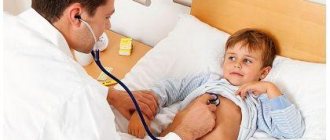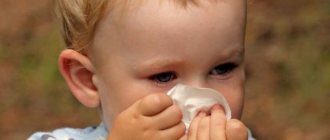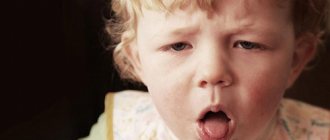How to treat a 3 month old child’s cough
When an infant begins to cough, you should not delay it and immediately call a therapist. Please note that everything happens quickly in the body of a small child. A slight inflammation can cause a condition that is dangerous for the baby. Before starting treatment, you need to know what caused the baby’s cough.
Causes of cough in infants
1. Due to acute respiratory viral infection.
2. Due to an allergic reaction.
3. If the laryngeal area is inflamed.
4. When a foreign body entered the respiratory tract, the child choked on liquid or milk.
5. Due to bronchospasm.
Adhering to an infant's cough regimen
It is important that a child who is ill does not overexert himself, plays calmly, and moves moderately. Please note that he should not be allowed to play or spin around; when he moves, the bronchi will be able to quickly clear the mucus that has accumulated in them and the child will be able to recover immediately.
When coughing in infants, it is important to perform a small massage of all vital points; lightly massage the chest and feet. Gently pat or tap, so the phlegm will go away faster; if you are not allergic, you can use a herbal balm.
The child should breastfeed as much as possible; for older children, give warm milk, fruit puree, and jelly. The more the child drinks, the faster a large amount of toxic substances will be released from his body, the sputum will be liquefied and eliminated.
Methods for treating dry cough in an infant
In some situations, it is necessary to take mucolytic and expectorant medications.
Plants such as elecampane, coltsfoot, juice prepared from black radish, plantain help well; it is recommended to add honey to it; you can also treat a cough in a baby with the help of anise seeds.
Medicines based on ivy are valued; the leaves are used for preparation; treatment with Gedelix and Prospan is especially effective.
The baby can be prescribed mucolytic drugs such as Ambroxol, Lazolvan, Ambrobene. For the first month of life, a child may be prescribed treatment with Ambrohexal, which can quickly remove phlegm and strengthen the immune system.
You can cure a child's cough using inhalation. For this you will need baking soda, Borjomi alkaline mineral water, and potato broth. Hold your baby in your arms over the steam.
Traditional methods of treating cough in an infant
When a child has a high temperature, warming procedures such as mustard plasters and compresses are prohibited. Onions with honey help well; for this, they are first crushed, honey is added, and everything is infused for an hour. The juice must be expressed and the child must be given a coffee spoon.
Herbs for cough for infants
After two months, it is recommended to use a decoction based on plantain, coltsfoot. If the child is already 4 months old, he can be given a decoction, which includes plantain, coltsfoot.
To prepare it, you need to take 250 ml of boiling water, brew the herb in it, and consume it before meals.
This is the best expectorant medicine, please note that the child may often vomit, so you should monitor the dosage.
The roots of marshmallow, elecampane, and licorice have a positive effect on the respiratory organs. The plants are mixed, then you need to pour boiling water, half a liter is enough, leave for 10 hours. The child should consume it three times a day.
Cough compress for babies
If the child is not allergic, you can use a compress with honey; for this you need to prepare a cake with honey, flaxseed oil, and a small amount of flour. Make a dense cake, it should not spread, then apply it to the baby’s chest area. From 6 months you can add a small amount of mustard to the cake.
Potato compresses use goat or badger fat to warm the breast well; gauze must be placed on top.
It is important to follow the rules when making compresses:
1. You must first take the fabric and fold it.
2. Medicine.
3. Place a diaper on top.
4. Polyethylene.
5. Gauze; if not, you can use a diaper.
6. The compress can only be placed on the chest area; it is not recommended on the back to avoid pneumonia.
If you use goat fat, you should rub it not only on the chest area, but also on the feet. This way the phlegm will go away faster. When a child has a dry cough, you need to frequently ventilate the room to humidify the air.
Inhalations for an infant
You can prepare passive inhalation for a two-month-old child, you need to heat the bath with boiling water, the room should be steamed. This type of inhalation is carried out for 10 minutes. If your child does not suffer from allergies, you can add eucalyptus oil.
Rules for treating cough in an infant
1. An infant should not be prevented from moving, otherwise the sputum will begin to stagnate.
2. Do not use traditional methods on your own; it is better to consult your doctor to avoid serious consequences.
3. Bathe your child in a warm bath with the addition of chamomile, sage, and thyme.
Thus, a cough in an infant should never be neglected; it must be treated promptly, because serious complications can arise. It is not always necessary to immediately give a small child antibiotics and a host of other medications.
First you need to find out what caused the child’s cough, how it proceeds, what type of cough the child has - dry, wet. Then make a decision about treatment. It is imperative that you immediately contact the treating doctor, he must listen to the child, and you may need to take some tests to clarify the diagnosis.
medportal.su
Cough in a one-month-old baby - causes, treatment
A cough in a one-month-old baby is a dangerous symptom; it can cause deepening of the voice, vomiting, constant restlessness, disturbed sleep, and the disease can be quite severe. It is important to find out the cause of the appearance in time and begin a course of treatment; often a cough in a month-old baby can, in severe cases, lead to respiratory failure, suffocation and death.
What causes a cough in a one-month-old baby?
A cough in a small child is a symptom of an acute respiratory viral infection; first the nasopharynx becomes inflamed, then the process spreads to the trachea, larynx, bronchi, and lungs.
Often, a month-old baby's ENT organs become inflamed - the pharynx, nose, paranasal sinuses; a cough may indicate adenoids. It can be one of the symptoms of incipient bronchial asthma, which causes a person to experience an attack of suffocation.
In a one-month-old baby, a cough may indicate that he has inhaled some foreign body, it has ended up in the bronchi, this is life-threatening, and urgent medical attention is needed.
A cough is often a symptom of problems with the stomach, intestines, or heart. Also, in one-month-old children, a severe cough is provoked by an unfavorable environmental situation - inhalation of cigarette smoke, a heavily polluted area, also due to dry air in the room.
Rarely, a month-old baby develops a cough due to pathological processes in the external auditory canal, an inflammatory process in the middle ear, and also of a psychological nature.
A dry cough may appear due to a lack of sputum, and the upper parts of the respiratory tract become inflamed.
This disease is very dangerous; in the future there may be laryngeal stenosis, and the upper respiratory tract will sharply narrow. The child cannot breathe fully; in this situation, it is important to urgently consult a therapist.
A wet cough in a one-month-old baby occurs when mucus gradually begins to accumulate and is not cleared out. It is easy to cough up thin sputum. In some situations it may bother you in the morning.
When a month-old baby has a cough due to a cold, at first it is dry, then it can become moist, then the child needs help to cough it up. If your health condition worsens, you should urgently consult your doctor.
Features of cough in a one-month-old baby
When an infectious disease affects the mucous membrane of the child’s respiratory system, the sputum begins to increase and may become viscous, and mucus is not released.
During inflammatory processes in the respiratory system, the metabolic process is disrupted, immunity decreases, and the protection of the bronchi and lungs decreases. The child does not have enough air, inflammation continues for a long time.
What kind of cough is dangerous for a one-month-old baby?
1. If it appears suddenly and does not stop for a long time.
2. When coughing, wheezing is heard.
3. Cough can be in the form of attacks.
4. Blood is visible in the sputum or it turns green.
5. The cough does not go away for more than three weeks.
Urgently call an ambulance if a month-old baby’s body temperature rises and it is difficult for him to breathe. A cough in a one-month-old baby may indicate a serious disease of the internal organs, so it is important to be examined in a timely manner. Often, a month-old baby may choke on milk; this can also be dangerous; if it gets into the lungs, the baby may choke.
If the child’s cough disturbs him at night and is dry, this is dangerous and may indicate that the baby has tuberculosis or enlarged lymph nodes inside the chest.
Treatment of cough in a one-month-old baby
Please note that cough in young children is quite difficult to treat; many drugs are prohibited for them, because they can lead to serious pathological processes in the liver, stomach, and intestines. Also, often different drugs can cause a serious allergic reaction, diathesis, dysbacteriosis, so you need to carefully monitor the child’s reaction to different groups of drugs.
Also, when treating a cough in a one-month-old baby, it is important to adhere to the following rules:
1. Monitor the humidity in the room. The air during illness should not be dry; use a humidifier.
2. Ventilate the room as often as possible; often, due to lack of fresh air, the child cannot recover.
3. Perform a gentle massage, so the sputum can be removed faster, and the child will feel much better.
4. The child should drink as much fluid as possible, especially at high temperatures, so that the body does not become dehydrated.
5. You can rub a thin layer of goat fat on the child’s back, chest, heels, put something warm on him, he should go to bed. Please note that this remedy can be used if there is no fever.
6. When there is no fever, you need to walk in the fresh air as much as possible, the lungs can fully open and become stronger.
A special patch will help alleviate the child’s condition; it is attached to clothing, it contains a large number of medicinal herbs, they have a positive effect on the mucous membrane of the larynx and nose. Sprays should not be used on a one-month-old baby; they can cause the baby to suffocate. In cases of severe inflammation, Tantum Verde is prescribed; it can be used to relieve a coughing attack.
So, a cough in a one-month-old baby can be a life-threatening symptom for the baby. Therefore, mothers should forget about self-medication methods and traditional medicine; they must immediately call the treating doctor so as not to aggravate the disease.
Due to the fact that the child will not dispel the reflex that will help cough up phlegm, you need to help the baby get rid of it, to do this, gently tap on the back, while the child must be placed on your lap upside down.
This is an effective cough remedy.
medportal.su
oriole777
We must first find out what is causing the cough.
if it’s a cold, you can try the traditional medicine, namely a tiny ball of sheep’s fat on gauze and put it on the child’s chest and let it stay like that for a day, under no circumstances bathe the child until he recovers, you can also take a leaf of fresh cabbage in a plate and mix everything in even proportions one at a time a spoonful of honey, vodka and a raw yolk put the voteta on a leaf and attach it to the chest, remove it when the leaf dries if you need to repeat But if I were you, I would definitely CALL THE DOCTOR NOW IT’S SPRING AN ALLERGIC REACTION IS POSSIBLE, especially since the child is small, I see they advise radish to a child at three months old, this is absurd Yes, and with honey, I don’t know how this could be recommended if the child was three years old, I agree the recipe is not bad, but at three months it’s absolutely rare and honey causes bloating. Just imagine what will happen to a three month old baby
Irina Zorina
No self-medication. Call a doctor, because the cause of the cough can be anything.
777
We must first find out what is causing the cough.
It could be a cold, or it could be an allergy. It's better to consult a specialist.
Irina Motorina
From traditional medicine: take a black radish, cut out the core and pour honey into the resulting cup. Honey will mix with radish juice, give this syrup. but this is provided there are no allergies. And, of course, it is better to resolve this issue with a doctor. Do not self-medicate your baby. Wishing you a speedy recovery.
Svetlaya
Smear the back and breast with regular honey overnight, wrapping it in some warm cloth, a flannelette diaper for example. In the morning there will be no trace of honey.
You can also draw an iodine mesh, you can alternate every other night, a night with honey, a night with iodine, my mother did this to me, I had constant bronchitis. I also remember when I was three years old, my mother made a tincture, honey + aloe vera juice + lemon juice (some add alcohol, but I wouldn’t give it to a child).
This syrup can be sealed in a dark bottle and stored in the refrigerator. Aloe draws out all the phlegm from the lungs. Be healthy.
Dancing Barefoot
There are such drops of Babix Inhalat - they contain oils, they need to be dripped onto clothes (on the collar). And there is a herbal syrup called GEDELIX. They won't do any harm, I think! But still consult a doctor so that you don’t have to treat advanced bronchitis or some other problem later!
Source: https://0p3.ru/kasel/rebenku-3-mesjaca-kashel-chem-lechit.html
How to treat a cough in a 3 month old child without fever
A cough without fever in a three-month-old child most often has a physiological nature and is not dangerous to health. But if attacks or additional symptoms appear, parents should consult a doctor. The pediatrician will identify the cause of the spasms and tell you how to treat the disease.
Cough without fever during feeding
At 3 months the child still does not know how to sit. If he is in an uncomfortable position when sucking milk, the liquid irritates the nasopharynx and makes him want to cough up.
Coughing during feeding is a symptom of hyperlactation. An abundant flow of milk can be suspected by the following behavior at the breast:
- clicking of the tongue when sucking;
- chest retraction;
- nipple squeezing;
- noisy swallowing;
- regurgitation after every meal.
The same signs of choking on milk appear when feeding through an uncomfortable nipple on a bottle during artificial feeding.
Cough with excessive drooling
Salivary glands form in the first months of a child's life. Sometimes they work excessively and saliva fills the baby's mouth, causing a cough. In this case, there are no symptoms of intoxication, and the temperature remains within normal limits.
When you cry, mucus is released in your sinuses. Together with tears, it irritates the nasopharynx, causing a cough.
Excessive salivation is the body’s protective reaction to the entry of microbes into the oral cavity. A 3-month-old child coughs when trying to chew rattles, toys and other objects, since at this time he is in a lying position, and saliva irritates the nasopharynx. There is no need to treat this physiological cough; it stops appearing on its own when the baby learns to sit.
Dry air in the apartment
Hot, dry air in the room irritates the child's cough receptors. Remember, the normal temperature is 19-20°, and humidity is 50-70%. To achieve such indicators, reduce the heating of the heating boiler, ventilate the bedroom while walking.
To less often treat diseases of the child’s respiratory system, purchase a humidifier. With the help of this device, an optimal level of humidity is maintained, the air in the bedroom is cleaned and disinfected.
Types of humidifiers:
- traditional (with a filter, but without heating elements);
- ultrasonic (releases a cool cloud of water molecules);
- steam (release a stream of warm steam);
- climatic (cleanse, humidify, heat the air).
Instead of moisturizers, you can use improvised products. Basins of water and wet towels hung on central heating radiators help normalize air humidity.
Herbal medicine methods
A cough without fever, which appears due to an improper microclimate in the apartment, can be treated without taking medications. To better moisturize the nasopharyngeal mucosa, add a drop of essential oil or a pinch of salt to the water of the device. Soak the towels in a decoction of medicinal herbs and hang them on the radiator.
Inhalations using a nebulizer and steam device are contraindicated for children under two years of age.
For coughs without fever, add decoctions of chamomile, sage, and oak bark to the bath. During bathing, a 3-month-old child relaxes and breathes deeply. Water procedures strengthen his immune system and help resist pathogens. Proper hardening allows you to treat your baby with pharmaceutical drugs less often.
Coughing up milk and foreign body
A 3 month old baby may choke when feeding and regurgitating. Signs of liquid entering the respiratory tract:
- sudden dry cough;
- copious secretion of saliva and tears;
- difficulty wheezing;
- sharp breaths with swallowing air;
- the skin turns red, then turns white and blue.
To restore breathing, place your 3-month-old baby on your left arm so that his chin is in the palm of his hand and his legs are at the elbow. Tilt your baby upside down and lightly tap your right hand between the shoulder blades.
If a 3-month-old child swallows or puts a small inedible object up his nose, you should take him to the doctor. If parents remove it themselves, they may damage the mucous membrane or push the foreign body even deeper.
How to treat an allergic cough
The cause of an allergic cough is inhalation of an irritant. It may be a substance that poses no danger to an ordinary child, but is harmful to children with a hypersensitive immune system.
Allergens include dust, pollen, mold spores, fluff particles, pet hair, spices, components of washing powder, and perfume products. The child’s body reacts to them with the formation of mucus in the nasal sinuses, increased lacrimation. When lying down, snot and tears flow down the nasopharynx, causing a cough. At the same time, the body temperature remains normal.
If parents smoke in the apartment, cigarette smoke irritates the child's respiratory tract, causing a cough without fever.
Before treating an allergy, it is necessary to identify the irritant. After eliminating contact with this substance, cough and runny nose often disappear on their own. To relieve swelling in the nasopharynx, the doctor prescribes an antihistamine. The dosage is calculated individually, taking into account the general condition of the baby.
In order to treat allergic cough without fever less often, it is necessary to create special conditions for the child.
- Do not have pets or birds.
- Do not place an indoor flowering plant in the bedroom.
- Do not use perfumes with a trailing scent.
- Buy a humidifier with an air purifying function.
- Wash things with a hypoallergenic detergent.
- Avoid feather beds and pillows.
Do wet cleaning in the apartment every day. Remove carpet, carpet, heavy curtains and other decorative items that retain dust from the child’s room. Remember, children with allergies cannot be treated with traditional medicine without consulting a doctor.
How to treat residual cough
If a child at 3 months has already had a respiratory disease, he or she develops a residual cough. The cause of the symptom is damage to the mucous membrane of the nasopharynx. Spasms intensify when inhaling cold air, cigarette smoke, or the strong smell of perfume. At the same time, the body temperature remains normal.
Doctors do not advise treating residual cough without fever with medications. The symptom will stop on its own after the walls of the respiratory organs have completely healed. For a speedy recovery, it is necessary to give a 3-month-old child warm, clean water to soften the nasopharynx, humidify the air in the children's room, and walk with the baby outside.
During walks, you should not put a lot of clothes on your child. Normally, after returning home, the baby should have warm hands, dry feet and back. When overheated, its mucous membranes dry out, which causes residual cough spasms.
The immunity of a three-month-old baby is not yet fully formed. Therefore, you should not visit crowded places with your baby. The same recommendation applies to a nursing mother. She needs to monitor not only the baby’s condition, but also her own health. Mothers should eat right, drink more fluids, and give up bad habits.
Source: https://stop-kashel.ru/chem-lechit-kashel-u-rebenka-3-mesyatsev-bez-temperatury/
Cough relief for 3 month old baby
» Cough » Cough for 3 month old baby
How to treat a cough in an infant?
When an infant begins to cough, you should not delay it and immediately call a therapist. Please note that everything happens quickly in the body of a small child. A slight inflammation can cause a condition that is dangerous for the baby. Before starting treatment, you need to know what caused the baby’s cough.
Tip 1: What cough remedy can be given to a baby?
Cough is a symptom of many diseases. In an infant, severe coughing attacks can lead to hoarseness, vomiting, restless behavior, and worsening of the condition.
Causes of cough in infants
Most often, cough is a symptom of acute respiratory infections, in which the inflammatory process affects the respiratory system.
Also, the cause of cough can be direct inflammation of the respiratory system and enlarged adenoids.
A cough with signs of suffocation occurs when a foreign body enters the trachea or bronchi. In this case, immediate medical attention is necessary, as there is a serious threat to the life of the newborn. An infant is not able to cough independently and get rid of a foreign body.
Effective cough remedies for infants
First of all, it is necessary to establish the reason why the cough occurred. After examining the baby, an experienced specialist will prescribe the correct treatment to quickly get rid of the unpleasant symptom. You should not self-medicate before a doctor arrives, as adverse consequences may occur.
Before the pediatrician arrives, you can pick up the child and gently pat him on the back. Such massage movements help remove accumulated mucus, clearing the airways.
The air in the room with a sick baby should be quite humid, so in the winter season it is necessary to put wet towels on the batteries or use a humidifier. Dry air provokes frequent coughing attacks.
For an infant, herbal preparations are ideal for thinning mucus and effective expectoration.
As a rule, these are decoctions of coltsfoot, elecampane, anise, thyme, wild rosemary, licorice, marshmallow, etc.
A modern cough syrup for children is “Gedelix”, which, due to the beneficial properties of ivy, increases the amount of mucus, enhances bronchial contraction and promotes the release of phlegm from the body.
When an infant coughs, you can rub the chest and back with Vitaon. It contains a large number of medicinal plants and essential oils that relieve inflammation and improve the baby’s condition.
During illness, provide your baby with plenty of fluids, which perfectly irrigates the throat and eliminates dry mouth. The drink should be warm, otherwise the mucous membrane will be irritated, increasing the pain.
KakProsto.ru
How to treat a cough in a baby?
Children in the first year of life who are breastfed usually have good immunity and very rarely get colds.
But bottle-fed and premature babies often get sick.
Factors that further reduce immunity include rickets, insufficient or excessive weight gain in the child, poor care, rare exposure to fresh air, and heredity.
Treatment of cough in infants: features
The main reasons for coughing in infants:
- ARVI, the most common symptoms of which are cough, runny nose and fever.
- Inflammatory diseases of the upper respiratory tract, which are bacterial complications of acute respiratory viral infections and are also manifested by coughing.
- Polluted air indoors or outdoors, too dry air in the child’s room.
- A reflex cough that occurs when a foreign body enters the upper respiratory tract. It appears against the background of complete health during meals, especially when eating nuts or dry cookies, as well as when the child plays with a severe coughing attack. Occurs with inflammation of the middle ear due to irritation of the eardrum.
Treatment of cough in children under one year of age depends not only on the causes of the cough, but also on the type of cough. There are the following types:
- dry, unproductive (without sputum production) and wet, productive (with sputum production);
- acute (up to 3 weeks) and chronic;
- constant and short-term, as well as episodic and paroxysmal.
How to treat a cough in an infant?
In infants, treatment of cough, especially with home methods, is possible only in the absence of elevated body temperature. If the temperature is elevated, then treatment of cough in infants is carried out only in the hospital under the supervision of a doctor.
If we are treating a cough without fever in a newborn, then first of all we must take care of the microclimate in the room where the child is. The room must be regularly ventilated - at least 2 times a day, the temperature should be 20-22 degrees, and to increase the air humidity in the room, you can hang a wet diaper or place open containers with water.
To improve coughing, the child is given a light massage of the chest and abdomen. To reduce intoxication and to prevent dehydration, the child is given a sufficient amount of liquid to drink.
Fresh air will be very beneficial for a child with a cough, so you should not avoid walking outside and it is recommended to put your baby to bed on a well-ventilated veranda for a nap, but only at normal body temperature.
If a child has a dry cough, it needs to be made moist, for which compresses are often used.
Medicines for the treatment of cough in the first year of life
For dry cough, drugs are used that suppress cough only when it becomes paroxysmal and risks becoming a harbinger of bronchospasm. Along with them, antiallergic drugs (Diazolin) are prescribed, and, if necessary, hormonal injections.
If the cough is wet, then to facilitate the removal of sputum, they use means to thin it out (Lazolvan, Ambroxol) in children after 3 years of age, as well as sprays, and to remove phlegm they use special massage techniques, teas with chamomile and coltsfoot, compresses and rubbing chest with eucalyptus ointment, mustard plasters through several layers of gauze.
At high temperatures, the doctor prescribes antipyretic drugs. And in case of purulent inflammation, an injection course of broad-spectrum antibiotics (most often from the group of cephalosporins) can be added.
WomanAdvice.ru
Pretty Women
We usually do the following when we have an ARVI with a cough and a runny nose (I understand from the prescriptions that you also have a runny nose): we rinse the nose with aquamaris or aqualor, in general with any sea water (sometimes I even make the solution myself - for 1 glass of warm sea water - 1 spoon of sea or regular salt, sea salt seems to be healthier, but it is quite difficult to find, so I often take regular salt), remove the nozzles with an aspirator or rubber bulb. If the nose is very stuffy and it’s difficult to breathe straight, then we drip children’s vasoconstrictors such as nazol, nasiivna, and so on. We put Viferon candles for immunity and fight the virus. A cough is often caused by a runny nose - the sniffles simply don’t clear out well, so they flow down the back wall of the throat and irritate it. Hence the cough. BUT, I still often give the child inhalations (with herbal decoctions - chamomile, calendula, oak bark, eucalyptus, alkaline mineral water, saline solution), give cough syrup like Prospan, be sure to rub the back and chest with warming ointments such as Pulmex Baby, Badger, and massage At the same time I do it to facilitate the discharge of sputum, it helps them a lot at this age)
Masha-Slavik Serdyuk
If you have a cough with phlegm, a drainage massage will help. Ask your local doctor. My little one is 4 months old. I had tracheitis, the cough was tormenting me, the nurse showed me the massage technique, after which the baby just coughed up the sea! After a couple of days everything went away.
Irina Lapshina
I agree that massage is a big help + warm drinks + balanced nutrition (we do too, since it is her nutrition that gives nutrition to the child).
What is mucus? This is poor nutrition, drinking little water, food waste and disruption of the flora and fauna of the body + low mobility of the mucous membranes.
This is why it is so important to use massage, because it will help remove negativity from the body; warm, clean water will thin out thick mucus. Good luck!
Romasanta
protorgol burns the mucous membrane
Guzel
try everything people suggested. Get well soon!!!
Other articles
Source: https://proprostudu.ru/kashel/ot-kashlja-grudnichku-3-mesjaca.html
How to treat cough in a 3 month old child, effective and safe remedies
How to treat a cough in a 3 month old child? At this age, you need to be especially careful about the child’s health. Therefore, treatment can begin only after examination and appointment by a specialist, and all the doctor’s instructions must be followed exactly.
Why does this symptom occur at 3 months? Most often it is a cold or allergy. However, there may be other reasons. At this age, the child has increased salivation. The baby may choke due to the large amount of liquid and begin to cough. The reasons for excessive salivation are as follows:
- Teething. Usually the process begins at 3 months.
- Saliva protects the oral cavity from germs, so when harmful microorganisms enter the mouth, salivation increases.
- The salivary glands are not yet fully formed, so they sometimes work excessively.
In addition, mucus may accumulate in a newborn overnight. It flows down the wall of the larynx, and this causes a cough reflex. Since a child at 3 months does not yet know how to blow his nose, this causes a cough. But that's absolutely normal.
In almost all cases, except for teething, the cough goes away quickly and is not accompanied by additional symptoms, that is, there is no fever or runny nose. If, in addition to coughing, other painful signs begin to bother you, it means that this is most likely a disease.
ARVI in young children is especially difficult. After all, at an early age, immunity has not yet been formed, the child cannot blow his nose yet, and this makes eating and breathing difficult. Babies become lethargic and moody. Colds manifest themselves as follows:
- stuffy nose;
- weakness and malaise occur;
- watery discharge from the nose appears;
- temperature rises;
- Dry cough bothers me.
As for allergies, they can also manifest themselves as coughing. But unlike ARVI, in such a situation the fever is usually not a concern. A rash and itching appear. Itching may occur in the nose and throat. Even your eyes can itch. In addition, swelling of the eyelids and frequent sneezing may occur.
Treatment of cough in a child
Treatment of such a small child cannot be started on your own. It is necessary to contact a specialist who will first make a diagnosis and then prescribe treatment. How to treat a cough in a 3 month old child? Here are the main medications if it is a cold:
- mucolytics – Flavamed, Lazolvan, cough syrup.
- antitussives – Sinekod, Panatus;
- expectorants - Gedelix and Prospan;
Flavamed - helps thin thick mucus. For children aged three months, the dosage should be prescribed by a doctor. Nausea and abdominal pain may occur. The drug is contraindicated in case of hypersensitivity to the components.
Important! Any medicine can have side effects, so you need to carefully monitor your child's reaction.
Lazolvan is a medicine that helps thin mucus. Children under 2 years of age can take 2.5 ml several times a day, but the dose, of course, must be clarified by the doctor. When taken, you may experience diarrhea and dry mouth. Do not give medicine if you have fructose intolerance.
Cough syrup is a dry powder containing plant extracts. The powder should be diluted in water and given to the child. Children under one year old – 20 drops. Usually diluted in a tablespoon of water. The child may have a stomach ache when taking it.
Sinekod is a remedy against severe cough. They are produced in syrups and drops; children aged 3 months can only use them in drops. Usually prescribed 10 drops several times a day. Dizziness and diarrhea may occur. The product should not be given to children under 2 months of age.
Panatus - the medicine can be used in drops if you have already had it for 2 months. Dosage is individual. Side effect is allergies. The drug is contraindicated in case of individual intolerance.
Gedelix is a herbal preparation. Children under one year old can drink half a measuring spoon once a day. The only side effects are allergies. It is forbidden to give the drug to children if there is an allergy to the components of the drug.
Prospan is also a herbal medicine. Children under one year old are allowed to take 2.5 ml 2 times a day. As with the use of other herbal medicines, allergies are possible.
How to treat a cough in a 3 month old child? It all depends on the nature of the cough. For dry symptoms, mucolytics and drugs that relieve attacks are prescribed. When wet - expectorants. You cannot take all types of medications at the same time.
If there is an allergy and therefore a cough is bothering you, antihistamines are prescribed. In addition, it is necessary to try to remove the allergen if you know what the reaction occurred to. As for anti-allergy drugs, young children are prescribed:
- Suprastin;
- Fenkarol;
- Diazolin.
Suprastin can be given for up to a year; it will relieve allergy symptoms and eliminate cough. You can give 1/4 tablet at 3 months several times a day. Side effects - nervous agitation, fatigue. Cannot be given under one month of age.
Fenkarol can be taken from 3 months. You can give 5 mg three times a day. You should not give the drug if there are disturbances in the functioning of the digestive organs or individual intolerance.
Diazolin is prescribed to children under one year of age in granules. A suspension must be prepared from them and given 2.5 ml a couple of times a day. Problems with urination may occur.
Fact! You can use both home remedies and medications.
Folk remedies for treatment
3 month old child: how to treat dry cough? Of course, a dry cough requires softening the throat and eliminating attacks. What will help treat cough? From this age you can already give onion jam. You need to grate the onion and mix with honey. After an hour, strain the resulting juice and give half a teaspoon. But you can use the product if you are not allergic.
Milk will also help cure dry cough. You need to dissolve a little butter in warm milk. This drink should be given to the child a teaspoon a couple of times a day. An infusion of chamomile flowers can also be given to a child several times a day, of course, also a teaspoon. You need to brew a teaspoon of raw material with a glass of boiling water and leave for an hour.
Inhalations will also help cope with dry cough. They are very easy to make. Just pour hot water into the bath and add sea salt. For the procedure, you need to be in the bathroom and inhale the vapors.
How to treat a cough in a 3.5 month old child? At this age, you can already use a potato compress. The vegetable must be boiled, mashed and added a little sunflower oil. Place the resulting mass on a napkin and apply a compress to the upper chest. The potatoes should be very warm, not hot. You can also warm your chest with coarse salt.
For a wet cough, a herbal decoction will help. It must be made from plantain and coltsfoot. Pour a tablespoon of the mixture with boiling water (a glass) and leave for 2 hours. Give by tablespoon. The product helps to cough up. Of course, you can use such a drink only if you are not allergic to herbs.
You can massage a wet cough. To do this, place the child with his stomach on his knees and stroke his back. Usually 15 minutes is enough for expectoration to begin.
Child 3 months old: runny nose, cough, how to treat? If you are worried about not only a cough, but also a runny nose, you will need to rinse your nose. How can you rinse your nose? This could be carrot or beet juice. It must be diluted with water in a ratio of 1:2 (there should be 2 times more water). It is necessary to rinse frequently.
You can also use aloe juice; it must be diluted in the same proportion. A decoction of chamomile will also help; you can also rinse your nose with it. The procedure should be carried out as often as possible, this will help remove mucus from the nose and throat. Consequently, both the runny nose and cough will go away faster. It will be easier to breathe.
Nuance! If you have a cough or runny nose, it is advisable to carry your baby upright more often and change the position in the crib.
For any type of cough, it is necessary to ventilate the room and moisten it. The temperature should be comfortable – 20-22˚C. This will help avoid drying out the air. If there is no fever, it is advisable to take the child for a walk. Fresh air will help kill germs and make breathing easier.
You should not use medications that are recommended by people who are not doctors. Child 3 months old: how to treat a cough, the forum of young mothers often discusses it, it is sometimes one of the sources of information. However, only a pediatrician should prescribe treatment. It will be the only right decision.
Source: https://antirodinka.ru/chem-lechit-kashel-u-rebenka-3-mesyatsev-preparati-i-narodnie-sredstva
Why does a grid worker cough?
There is no need to rush to treat a cough in a baby without fever. It is necessary to determine its cause, to make sure whether it is an infection, or whether a foreign body is stuck in the nasopharynx. To do this, you need to visit a doctor.
For wet cough syndrome
The doctor recommends expectorants in this case. ☘️ Their action is to facilitate coughing up mucus. For this purpose, small children are prescribed Gedelix and Prospan syrups, which can be given even to a newborn. They also prescribe Linkas, ivy-based syrup Gerbion, a drug with licorice root (from 5 months of age), Bronchipret.
Mucolytics
These medications make sputum less viscous, which facilitates its separation. Of the mucolytics allowed for infants, the most often prescribed are:
- Ambroxol (it is prescribed more often because there is extensive experience in its use safely and effectively);
- Bromhexine with Acetylcysteine;
- Fluditec in Villa Syrup.
Mucolytics are given to an infant only with a doctor's prescription
Antihistamines and aseptic agents
The doctor prescribes antihistamine medications for allergic coughs. Antibiotics are prescribed for viral infections that manifest as coughing, such as pneumonia or sore throat.
There are also combination drugs that contain several components, for example, Bronchipret contains extracts from ???? thyme and ivy. It is prescribed to children from 3 months.
Physiotherapy
In addition to medications, physiotherapy is used in the treatment of infants;
- Inhalations .☁️ They are done using steam or a nebulizer. But they do this extremely carefully to prevent burns. In a nebulizer, only saline solution can be used for the procedure without a doctor’s permission.
- Drainage massage . ☔️ This procedure is performed on babies only if they do not have a fever. Moreover, it is prescribed not from the first day of the disease, but from about the fourth, in order to facilitate the separation of mucus. When performing manipulations, the baby’s head is placed slightly lower than the entire body. First, the back is rubbed, and then the chest. At the end of the massage, the baby is wrapped up and placed in bed.
ethnoscience
☘️ A runny nose and cough in a baby are sometimes treated with folk remedies. For this purpose, decoctions of herbs, cakes with honey, and rubbing with badger or goat fat are used.
When treating pathology, medicinal herbs are combined in different mixtures. They include marshmallow with anise, coltsfoot with licorice, plantain with oregano and other plants.
But doctors recommend using one plant during complex treatment to avoid allergies.
It is most often used in the form of tea, decoction for inhalation.
For tea, pour a tablespoon of dried flowers into a glass of boiling water and cover with a lid. After 10 minutes, after straining, this tea is given three times a day, thirty minutes after feeding, in an amount of 30 ml to children from the first month.
Tea recipe for newborns
It is impossible to cure pathology with chamomile or any other method.
Rubbing
Rubbing is recommended for children from 6 months. For younger infants, the procedure is performed only under the strict supervision of a doctor. Camphor oil is allowed from one year onwards.
They also use ointments that can be bought at the pharmacy, for example, Pulmax baby. The folk method is represented by products made from liquid honey or lard, goat fat with propolis.
But if the baby is not a month old or even six months old, it is better not to use such a procedure in therapy.
Perform manipulations in the evening, before going to bed. The movements should be light, circular, in a clockwise direction. It is unacceptable to rub the baby with ointments in the area of the nipples and heart.
After rubbing, the baby is wrapped warmly, wearing socks.
But in order for the baby to be cured, great care is needed.
Komarovsky's recommendations
The famous pediatrician Komarovsky believes that an infant coughs not always due to illness. This is a natural reaction of the body to foreign objects or substances entering the respiratory system. If this occurs in a baby, Komarovsky advises contacting a specialist rather than giving the baby medicine.
A popular doctor recommends using such productive ways to eliminate the syndrome. ☘️ For example, humidifying the air in the nursery and drinking plenty of fluids helps.
If signs of an allergy appear after using the medicine, you must stop therapy and consult your pediatrician.
Cough in infants and newborns - causes and treatment
A child's cough is scary for many parents. Inexperienced mothers and fathers are especially wary. When an older child gets sick, he can explain how he is feeling and talk about additional symptoms. The situation is different for infants 2-4 months old.
Children in their first year of life are especially vulnerable. Their immunity is just beginning to form, which means that there are many different diseases ahead, the symptom of which may be a cough.
Source: https://xn--80aadc3bb0afph1dp3h.xn--p1ai/dyhatelnaya-sistema/pochemu-voznikaet-kashel-u-gridnichka.html











